Posts from — February 2010
Rwanda: Ongoing Hardships and No Reconciliation Yet

Dr Susan thomson
For most ordinary Rwandans, life since the genocide has not been as pleasant as the country’s authorities would pretend.
That is what clearly appears in the article “False Reconciliation” published by Susan Thomson (SSHRC Postdoctoral Fellow, School of Political Studies, University of Ottawa). Here is what she writes:
As Rwanda gears up for Presidential elections in August, it is a good time to reflect on the progress the country has made since the genocide in 1994, both in image and in reality.
By most popular accounts, Rwanda is a nation rehabilitated. Diplomats and journalists talk of President Paul Kagame�s phenomenal success in rebuilding the once-shattered country.
The capital, Kigali, boasts a modern airport, several international hotels, a modern ICT infrastructure, and countless new residential and commercial properties. Numerous caf�s and nightclubs have opened, catering to the city�s growing middle class of bureaucrats and businesspeople. Kigali�s crime rate is low and its streets are clean.
In the Rwandan Parliament, women hold 56 per cent of seats, the highest proportion of female representation in the world. Tony Blair is a presidential advisor and international dignitaries, including Bill Clinton, Bill Gates, and Howard Schultz of Starbucks, frequent the country.
Kagame is praised as a benevolent and thoughtful leader who cares deeply about his people. His policies have reconciled the Hutu perpetrators of the genocide with Tutsi survivors. Community-based gacaca courts have processed more than 100,000 Hutu accused of acts of genocide with most successfully reintegrated into society.
But most foreign visitors do not see the deep poverty and daily hardships that confront ordinary Rwandans. For most of them, Hutu and Tutsi alike, life since the genocide is not as bright and shiny as the authorities in Kigali would pretend.
Some 90 per cent of Rwandans are peasants who rely on subsistence agriculture. Few of them have benefited from the country’s rapid reconstruction. The gap between the wealthy urbanites and the poor rural dwellers is on the increase. Government policies favour the urban elite, many of whom are Tutsi who returned to the country after the genocide.
The vast majority of Rwandan women and men who survived the genocide remain extremely poor, politically marginal, and, in many cases, traumatised by what they lived through. Almost 95 per cent of Rwandans in the country during the genocide have post-traumatic stress disorder. Few receive government-sponsored counselling or support.
With rare exceptions, Rwandan peasants are thin, their eyes lacklustre from continued hunger, with weathered hands and faces, giving them the appearance of being older than their actual age. Some have orange hair, a telltale sign of malnutrition. Many go barefoot and dressed in ragged clothes � often the extent of their wardrobe.
Most of the Rwandans I spoke to lamented the constant struggles of everyday life since the genocide. For them, there is a lack of food, clean water, and affordable and proximate health services.
Increasing levels of authoritarianism by the ruling Rwandan Patriotic Front (RPF) stifle any attempts to address these inequalities.
Public space for free and open political expression is limited. The media and civil society operate at the behest of the RPF. Any individual or group that challenges the official government version of Rwanda as a rehabilitated nation, peaceful and secure, is harshly dealt with.
Opposition politicians, journalists, and ordinary folk alike who criticize the government are all subject to harassment, intimidation, disappearance, and, in extreme cases, death. Just ask Joseph Sebarenzi, the former Speaker of the House. Kagame forced him into exile in 2001 for his efforts to constitutionally limit the powers of the president. He writes about his experience in his recent book “God Sleeps in Rwanda“.
Instead of allowing for frank and open discussion of the genocide, the RPF has forced reconciliation upon the people. They make Hutu tell the truth about what they did during the genocide, and make Tutsi forgive them. Reconciliation is not a sincere affair of the heart; it is an administrative matter.
The ordinary Rwandans I talked with are more than just skeptical about the government�s commitment to reconciliation; they also recognise it as a form of social control.
As Olive, a Hutu widow whose Tutsi husband died during the genocide told me, �All these confessions are a program of the government. Hutu confess to get free. But we know what happened! We were there in 1994. Not all who killed get justice � the government pardons them for reconciliation. Not all who didn�t kill go free � the government puts them in prison for reconciliation. What kind of peace is this? It is not from the heart.�
Local officials harass and intimidate those who fail to embrace this reconciliation; anyone who questions the sincerity of it can be imprisoned.
This is not a process grounded in an enlightened vision of peace and security. Instead, it forces Rwandans to remain silent and to not question the RPF version of peace and security. Rwandans are only simulating reconciliation as a means of coping with the demands of their government. As Jeanne, a Tutsi widow, said, �There can be no peace in the heart if there is no peace in the stomach.�
For many ordinary Rwandans, this has been an alienating, oppressive and sometimes humiliating experience � something that could, paradoxically, crystallize and create stronger dissent in the future, perhaps erupting into violence as early as August 2010 when Rwandans go to the polls again.
February 14, 2010 3 Comments
Rwanda and United Kingdom Sign Agreement To Exchange Prisoners
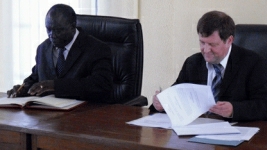
Rwandan Ministre of Justice and UK Ambassador
KIGALI – In the Kinyarwanda section of Rwandinfo.com, we have already announced recent agreement for exchange of prisoners signed between Rwanda and the United Kingdom. For our English-speaking readers, here is what New Times reports about that agreement.
Rwanda, the United Kingdom and Northern Ireland on Thursday signed an agreement for exchange of prisoners, a development that paves way for convicted criminals to be extradited to their respective countries to serve their sentences.
Under the deal, Rwanda will soon be able to receive some of its natives who are currently incarcerated in UK and Irish prisons.
According to the British High Commissioner to Rwanda, Cannon Nicholas, there are currently 15 Rwandans in UK prisons.
No British citizen in Rwandan prisons.
The treaty is aimed at strengthening judicial cooperation between the countries regarding the exchange of persons who commit crimes away from their countries of origin.
�The reason behind this agreement is to have these prisoners serve their sentences from their countries of origin where their relatives can access them and be monitored by their governments,� said Cannon.
He however added that this agreement only applies on people who committed crimes outside their countries, implying that this treaty will not apply to Genocide fugitives who are either in the UK or Ireland.
The treaty, a copy of which The New Times has obtained, takes into consideration multilateral agreements governing the transfer of sentenced persons to which both parties may be party.
�Provided both parties agree, a sentenced person may be transferred from the territory of the transferring State to the territory of the receiving State without the consent of the sentenced person in accordance with the provisions of this agreement in order to continue serving the sentence imposed on him or her by the transferring State,� reads a clause in the agreement.
The 16-article document also sets the conditions under which a sentenced person may be transferred.
�The sentenced person is a national of the receiving State,� reads the document. �he acts or omissions for which the sentence has been imposed (must) constitute a criminal offence according to the law of the receiving State or would constitute a criminal offence if committed on its territory,� it adds.
The subjects for transfer, according to the agreement, must have at least 6 months of the sentence to serve at the time the request for transfer is made.
It however leaves room for exceptional cases, where the two parties may agree to transfer someone even if the person had less than six months to serve.
Source:newtimes.co.rw
February 13, 2010 No Comments
Premier Makuza Warns Opposition Leader Victoire Ingabire

Premier Bernard Makuza
KIGALI – Prime Minister Bernard Makuza has lashed out at Victoire Ingabire, the leader of the yet-to-be-registered political party � FDU-Inkingi, for what he said is an attempt to disrespect Rwandans and the country�s laws.
The Prime Minister said that Ingabire�s rhetoric showed utter disrespect for Rwandans and what they have worked hard to achieve over the past 16 years.
�Wanting to disrespect Rwandans [saying] that they live in fear, or belittling what they have achieved, like Gacaca which Rwandans created on their own, as well as other policies meant to bring about unity and reconciliation, is something Rwandans cannot accept,� Makuza said.
He accused Ingabire of trying to instil fear in people, strongly warning her against this path, especially the attempt to use ethnic card.
�Rwandans have long since done away with such fear and they cannot allow anyone to lead them into the politics of anarchy that takes them back while destroying what they have built�.
The PM made the remarks yesterday while briefing reporters outside his offices in Kimihurura, shortly after holding separate closed bilateral discussions with the new Ambassadors of DRC and Burundi.
He downplayed Ingabire�s recent summoning to the Criminal Investigations Department (CID), saying that it was normal procedure.
The Premier stressed that with respect to the law, what was important was whether the people or institutions interrogating anyone have the legal authority to do so and are doing it within the confines of the country�s laws.
�I think that the institutions like the police have that right. If at all they did not do that, even Rwandans would question why those institutions do not carry out their duties yet they have that responsibility�.
Makuza stressed that Ingabire, or any other Rwandan, has the right to aspire to be a presidential candidate or any other post, but must not contravene the law.
�Rwanda is not a jungle where people do whatever they want. That is why there are laws � if you don�t respect the law, the law takes you to task,� the PM warned.

Victoire Ingabire
Victoire Ingabire Umuhoza who returned to the country last month after 16 years in the Netherlands and who is the presidential candidate of the FDU-Inkingi for the upcoming presidential elections, has been an outspoken critic of the RPF government. She has angered Paul Kagame�s regime when she declared that Hutu who have been killed during the genocide should also be remembered and their killers brought to justice. Rwandan authorities consider her declarations as �divisive and revisionist� and espousing the double genocide theory.
Source: newtimes.co.rw.
February 12, 2010 No Comments
Angry Paul Kagame Says Criticism of Rwandan Genocide Law is �nonsense�
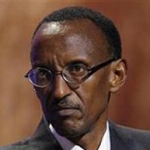
Kagame, angry and upset!
Kigali: President Paul Kagame has angrily dismissed any criticism of the Genocide ideology law coming from donors, rights groups and exiled opposition, saying nobody has the right to undermine what happens in Rwanda, RNA reports.
Since the passing of a law in 2007 criminalizing negating the Genocide � described here as �Genocide Ideology�, fierce critics have claimed that it has been used to stifle free speech and squeeze the opposition. The harshest attack came last year from the Commonwealth Human Rights Initiative, which was opposed to Rwanda�s admission into the British Commonwealth block.
Amnesty International and Human Rights Watch, as well as the US government in its annual human rights reports, have repeated the same attacks. The latest came when York-based Human Rights Watch claimed Wednesday that government was using the law �as a way of targeting and discrediting its critics�.
Amnesty International has also argued that the terms of the law criminalizing �genocidal ideology�, are �vague and ambiguous�. The group also says this law could potentially restrict the ability of the accused to put forward a defence in criminal trials. The offence is punishable by 10 to 25 years� imprisonment.
President Kagame on Friday seemed to have had enough. Addressing the judiciary, senior government officials and diplomats at the Parliamentary building at the start of the judicial year, Mr. Kagame described the criticism as �complete nonsense�.
The President wondered why international media and diplomats accredited to Kigali repeatedly claim the Genocide Ideology law is not clear.
�Sometimes a person wonders��but how come your laws criminalizing divisionism and others against negating the holocaust are not ambiguous?� How come you implement them? What specialty do you have that others cannot have?�, said Mr. Kagame, in a mixture of English and Kinyarwanda.
�What they are trying to say is that all of you here seated with huts and robes have no brains,� he said, amid muted laughter from the audience. The President also accused the west of consistently undermining �Rwandans and Africans� by always being suspicious of everything done on the continent.
With an unusually high tone, suggesting that he was angry and also not reading from the prepared speech, Mr. Kagame fired in English: �We�ve lived this life. We�ve lived the consequences. So, we understand it better than anyone from anywhere else.�
�Apart from this over-bearing attitude of always wanting to decide for others what they should do, what do these people have in their brains�heads that we don�t have?. What is it? Why almost everyday question what people do for themselves?�
Turning to Kinyarwanda, President Kagame told his audience that critics can only be found to be wrong depending on how the country�s institutions are built.
�We ensure all is done with ultimate courage�explain to whoever doesn�t understand�such that even if we remain with some who do not want to understand, just like we even have them,� he said.
Mr. Kagame said criticism from the outside should not make those implementing policies internally to lose morale because they are doing it all for themselves and the country.
�This is the only way that we will silence those who are always speaking nonsense,� he summed.
The judiciary had earlier presented several achievement attained over the past year, and President Kagame was on hand � thanking them. He also promised to avail them with his contribution at anytime �because it is my responsibility�.
Source:rnanews.com.
February 12, 2010 1 Comment
Rwanda Launches The East Africa’s First eID Scheme
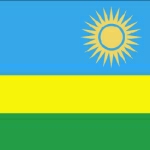
Rwanda Flag
Kigali – The Ministry of Local Government in Rwanda has agreed with De La Rue Identity Systems, a UK-based world expert in secure e-government identity solutions, to design and roll-out East Africa’s first national eID project for the Government of Rwanda, as part of the ongoing Rwandan National ID project (NID). The plans for systems integration, to combine data from the current ID card, passport and driver’s licence, are already underway. The first eID documents are expected to be distributed in around six months, following successful completion of the pilot phase.
Rwanda’s existing national ID card, also produced by De La Rue, is currently held by all citizens over the age of 16. It is envisaged the new eID card will replace this and contain additional e-government information, such as health and social security details. This puts Rwanda at the forefront of regional IT advancement.
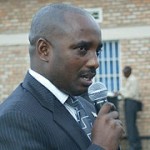
Pascal Nyamurinda-NID Project Coordinator
Pascal Nyamurinda, National ID Project Coordinator, Ministry of Local Government said “Rwanda is very proud to be launching East Africa’s first eID scheme. This project is of utmost importance for our country, providing our citizens with access to additional services through the use of a highly secure eID device. We have chosen to work with De La Rue for over ten years now and throughout that time we have been impressed by their constant efforts to exceed our expectations, always delivering an innovative and trusted solution.”
James Thorburn, Managing Director, De La Rue Identity Systems commented “De La Rue is delighted to be strengthening its relationship with Rwanda, focused on delivering a dynamic strategic project. We already provide the country’s passport, current ID card, driver’s licence and supporting systems so we are able to use our local knowledge and expertise, as well as experience from implementing over 50 national schemes, to ensure successful implementation of the new eID project.”
De La Rue is the world’s largest commercial security printer and papermaker, involved in the production of over 150 national currencies and a wide range of security documents such as passports, authentication labels and fiscal stamps. De La Rue employs over 4,000 people across 24 countries and is a member of the FTSE 250. Its ordinary shares are listed with the UK Listing Authority and trade on the market for listed securities on the London Stock Exchange under the symbol DLAR.
February 12, 2010 1 Comment
London Manifestation of Rwandans For Cessation of RPF Harassment in Rwanda
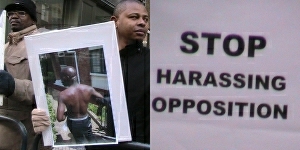
Some banners at London Manifestation
LONDON – On Wednesday 10th February 2010, a group of Rwandans and Congolese from DRC convened from 2.00 pm at the High Commission of Rwanda in UK to protest against the regime of Kigali for harassing Rwandan political opponents.
The manifestation took place in front of the Rwanda House located at 120 � 122 Seymour Place, London W1H.
Slogans on the displayed banners included the following messages: �Democracy for Rwanda Now, Stop Harassing Opposition, Free Joseph Ntawangundi Now.� On some of the banners were pictures showing Joseph�s scars after the beating by RPF militia in Kigali on 3rd February 2010.
The protesters find that people have been patient enough about the crimes and abuses of human rights by the RPF regime against Rwandans.
They are very much inspired by the courageous determination of Mrs Victoire Ingabire Umuhoza, Chair of United Democratic Forces UDF-Inkingi, to politically and pacifically challenge the Kagame regime in Rwanda. They told news reporters that what Victoire Ingabire has started won�t stop until Rwandans have democracy, justice and respect of the basic human rights they have been denied for the last 20 years because of RPF. They expect the world to know more about their suffering and help them make pressure on Paul Kagame to change his policies towards the Rwandan population.
Congolese who joined the protest are fed up by the ongoing humanitarian crisis in the Great Lakes region where occur recurring wars sponsored by international interests in the mineral resources of DRC. All recognize that RPF is the source of all the tragedies in the whole region and agree that re-instauring democracy in Rwanda will greatly ease the suffering of so many millions in the region.
February 11, 2010 3 Comments
Victoire Ingabire summoned by Criminal Investigation Department
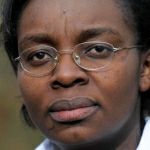
Victoire Ingabire
KIGALI – Victoire Ingabire, leader of the opposition party FDU-Inkingi was yesterday summoned and interviewed by the Criminal Investigation Department (CID) at the Police Headquarters in Kacyiru.
The details of the investigations have not been clarified by the Police.
Victoire Ingabire was questioned and was later allowed to return home.
The Rwanda News Agency quoted Kagame on Monday as charging that Ingabire was “making comments and doing all her activities illegally and as an ‘individual’ because her party has not been registered.”
Victoire Ingabire who was in the company of her lawyer Protais Mutembe during the questioning, declared afterwards to the BBC that the questioning was related to her views about genocide and crimes against humanity and her alleged relationship with the FDLR rebels.
Victoire Ingabire who returned to the country last month after 16 years in the Netherlands, has been an outspoken critic of the RPF government. She has angered Paul Kagame’s regime when she declared that Hutu who have been killed during the genocide should also be remembered and their killers brought to justice. They consider her declarations as �divisive and revisionist� and espousing the double genocide theory.
Last week, Ingabire and her assistant Joseph Ntawangundi were attacked by RPF militia at Kinyinya Sector.
Since then, Joseph Ntawangundi has been jailed as a 2007 Gacaca court convict for genocide crimes. Joseph protests his innocence and his party FDU-Inkingi claims he could not have committed such crimes as he was not in Rwanda in 1994.
These series of incidents are meant as intimidation tools meant to harass people, discourage any meaningful opposition and undermine the advent of democratic rule in Rwanda.
February 11, 2010 No Comments
Kigali – Case of Joseph Ntawangundi: Another Evidence of Gacaca Courts Farce in Rwanda.
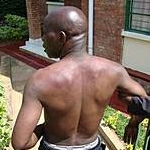
Ingabire's Assistant beaten-up
After her assistant Joseph Ntawangundi was put in police custody following revelations by the New Times that he was a ‘Gacaca fugitive’ already sentenced to 19 years jail, the opposition leader Victoire Ingabire, chair of the UDF-Inkingi alias FDU-Inkingi issued a statement stressing that this is another shameful propaganda based on lies in the Gacaca system.
Here follows Ingabire�s press release:
NEW TIMES, A JUDGE AND JURY, EXPLOITING FORGED GACACA EVIDENCE, TO MAKE MORE VICTIMS.
We read with utmost concern, the New Times of Saturday, 6th February 2010. The fire spitting media has unveiled its true colors. The title on the front page �Ingabire�s assistant a Gacaca fugitive� alleging that Joseph Ntawangundi was sentenced to 19 years in absentia, is sheer lies.
Joseph Ntawangundi left Rwanda in 1986 for studies in Poland (Wroclaw), returned to Rwanda in 1992 and worked in Kigali (CESTRAR). In 1993, he left Rwanda for ICFTU – AFRO (international confederation for free trade unions, African Regional Organisation, NAIROBI, Kenya) as a Research and Training Officer until 2002. During the genocide, Mr. Joseph Ntawangundi was attending, on behalf of the ICFTU � AFRO, a 2-month training course in Sweden (GANGNEF) and returned to Kenya.
He never officiated in the education sector in Rwanda, in any capacity whatsoever. He has never been school director in Gitwe during the genocide, as claimed by the paper. Either the reporters have been mislead, or they deliberately want to mislead the readers for their own agenda.
Since Mrs. Victoire Ingabire Umuhoza returned to Rwanda, this paper has been recklessly issuing fabricated stories without giving any chance of counter evidence, in total disregard of media ethics.
I challenge the paper to produce any evidence of its allegations, at least for the sake of the readers’ respect. Else, let it give a right of answer to Mr. Joseph Ntawangundi.
Even if our position about GACACA has not changed, we hope that it has not fallen this low to condemn an innocent who was not even in Rwanda during the genocide, and for crimes committed in a place he has never been to.
Meanwhile, we’ve just learnt that Mr Joseph Ntawangundi has been picked up by the police and is currently held at Remera police station. This shows the kind of relationship between New Times and security forces which rely on libels from this paper.
We would like to recall that Mr Joseph Ntawangundi is still recovering from injuries sustained on 3rd February 2010, following attacks in government premises in Kinyinya sector. He is expecting justice, not mob justice.
UDF INKINGI
Mrs. Victoire Ingabire Umuhoza
Chairperson
February 8, 2010 1 Comment
Lies and Gacaca As Main Weapon Against Political Opposition in Rwanda
The New Times newspaper of spreading false propaganda about her aide, Joseph Ntawangundi.
A few days after Victoire Ingabire and her assistant Joseph Ntawangundi were nearly lynched by a rowdy group of local militia in the administration offices, the New Times newspaper – mouthpiece of the ruling RPF party of President Paul Kagame – reported that Ntawangundi was a fugitive long wanted by the Gacaca court on charges related to the 1994 genocide.
Here is what The New Times (http://www.newtimes.co.rw/index.php?issue=14163&article=25610) publishes in an article titled:
Ingabire�s assistant a Gacaca fugitive:
� Handed 19 yrs in absentiaKIGALI – Victoire Ingabire�s assistant, Joseph Ntawangundi, the man who came to the limelight in the saga at Kinyinya Sector, is a wanted Genocide fugitive who, in 2007, was sentenced in absentia to 19 years in prison by a Gacaca Court.
Ntawangundi was found guilty by the Gacaca court in Rusenyi cell, Gitwe sector in the former Kibungo Province, present day Ngoma, for killing two young people only identified as Nsabimana and Hategeka.
The two were students of IAVE Gitwe Secondary School in Kibungo where he was a director at the time. He was also found guilty of conspiring with militias to murder eight other people.
According to Beline Uwineza, the coordinator of Gacaca in the Eastern Province, Ntawangundi fled in 1994 to Benaco Refugee Camp in Tanzania before finding his way to Europe.
�His file and arrest warrant have been around. His case was a category two type. We were surprised when we saw his pictures in the news media after all these years,� she said.
�The arrest warrant is still valid of course. The next step will be to make sure he serves his jail term. Gacaca will do everything within its means to bring him to book�.Witnesses testified that Ntawangundi being the director of the school, many students ran to him for protection during the Genocide, but that he kept turning them away and they would then be killed by militias lurking outside.
The two children he killed had also run to him for protection.
He is one of the thousands of people whom Gacaca has sentenced in absentia.
This is the second time that someone connected to the presidential aspirant is discovered to have links to the killings of innocent people during the 1994 genocide against the Tutsi.
Ingabire�s own mother, Therese Dusabe, had also been found guilty earlier on two separate occasions and sentenced to 30 years and life respectively.
According to FDU-Inkingi’s chair Victoire Ingabire, this Gacaca story is a pure lie as Joseph Ntawangundi had left Rwanda in 1993! Read Victoire Ingabire’s press release explaining why in the article: Kigali � Case of Joseph Ntawangundi: Another Evidence of Gacaca Courts Farce in Rwanda.
This is again another proof that the Kagame regime would continue to recourse to any sort of of lies and character assassination propaganda, in order to bar the opposition from fairly challenging him in the upcoming presidential elections.
February 8, 2010 No Comments
Kigali-Rwanda: Calendar Of Upcoming Presidential Elections Released
KIGALI – The National Electoral Commission (NEC) has released an updated calendar of the upcoming presidential elections detailing dates for the series of events that will lead to the August 9 Presidential Polls.
The electoral code that is currently in parliament is expected to be promulgated soon and published in the official Gazette.
Here are the key dates for the events that will lead to the August 9 Presidential Polls:
– Between June 24 and July 02: Nomination of presidential candidates
– July 07: Declaration of the final list of candidates approved by NEC.
– July 20: Nominated candidates will start campaigning
– August 08: End of electoral campaign
– August 09: Presidential polls.
– No later than August 17: Final declaration of presidential election results and announcement of the winner.
Note that one newcomer in the Rwandan politics, Mrs Victoire Ingabire Umuhoza, has already been designated by her still-to-be-registered FDU-Inkingi party as their presidential candidate and is already in Rwanda, trying against all odds to register her party in order to challenge the redoutable RPF candidate Paul Kagame.
February 8, 2010 No Comments
